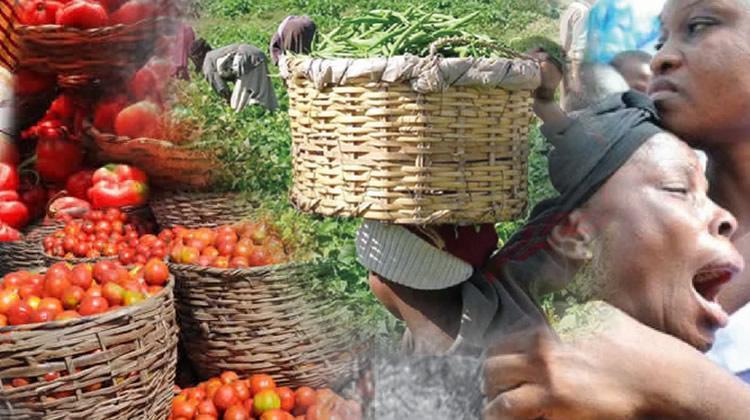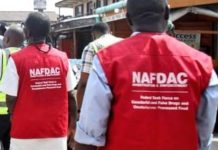By- Abba Hamisu Sani
Africa-Press – Nigeria. Food Security is essential to national security at any point in time, especially at this moment when the Nigerian population is growing rapidly.
Nigeria as a nation is facing several security challenges which are undeniably attributed to poverty and food insecurity as the majority of the citizens are living below the poverty line.
At the end of 2023, there is a staggering increase from the 18.6 million people food insecure as conflicts in the North East region have displaced 2..2 million people and left another 4.4 million food insecure in Borno, Adamawa, and Yobe States. Three million of them are in Borno State, the epicenter of the Boko Haram insurgency.
The root factors that contributed to food insecurity in the most populous African country include insecurity, unsustainable development, poverty, corruption, national policies that do not promote equal access to food for all, environmental degradation, barriers to trade, insufficient agricultural development, population growth and, low levels of education.
Subsidy removal plus Naira floating deteriorate the food insecurity
Finding it difficult to access food for the majority of Nigerians is no longer a news but gets worse when President Tinubu removes the fuel subsidy and floats the country’s currency. These twins policies push inflation so high to the level that it crippled the purchasing powers of Nigerians.
Transportation and other Agricultural inputs prices skyrocketed. This situation created much food insecurity as the majority lack access to food due to the increasing rate of poverty.
31.5 Million Nigerians at risk of food insecurity
Cadre Harmonise (CH) report indicated that about 31.5 million Nigerians may experience a food and nutrition crisis between June and August 2024.
This is an outcome of a food and nutrition insecurity study conducted by the Ministry of Agriculture and Food Security in collaboration with other partners including the United Nations Food and Agriculture Organization (FAO).
The report also indicated that about 24.7 million people, including 14,000 Internally Displaced Persons -IDPs in 26 states and the Federal Capital Territory (FCT), are to experience a food crisis between March and May 2024.
“About 1.1 million people in Adamawa were expected to be in crisis or worse between June and August 2024, and about 2.1 million people in Borno were expected to be in crisis or worse between June and August.
Also, 1.5 million people in Yobe State are expected to be in crisis or worse between June and August this year.
During the current period, food consumption was under stress in most of the states, and crisis in some Local Government areas in Adamawa, Borno, Katsina, Yobe, and Zamfara states,
Deteriorated food consumption situation was also observed among populations in the inaccessible areas and the IDPs in Adamawa, Borno, Sokoto, and Zamfara states.
During the projected period (June to August 2024) more households are expected to face crisis levels of food consumption in the states”the report said.
The report added that the imminent crisis is largely triggered by the surge in prices of food items which was linked to the removal of petroleum subsidy.
Food Crisis factors in the identified states
Some of the contributing factors to the food crisis highlighted in the harmonized report include insecurity, fuel scarcity, the naira devaluation currency crisis, and rising inflation and consumer price index (CP) rates.
“The consequences of insecurity have led to the loss of livelihoods in Adamawa, Benue, Borno, Katsina, Niger, Plateau, Sokoto, Zamfara and Yobe States.
Poor macroeconomic conditions are restricting access to agricultural inputs in the country, the high cost of transport, the inflation rate, and the volatile dollar- -Naira exchange rate have negatively affected household income.
In the projected period (June to August 2024), poor microeconomic conditions and conflicts are expected to drive limited access to livelihood opportunities.
The nutrition situation in the Borno, Adamawa Yobe and Northwest states of Katsina,Sokoto, and Zamfara revealed the prevalence of malnutrition for under – 5 children to be in crisis in the current situation “the report added.
Retson Tedheke is an agriculturalist and large-scale farmer. He said the problem of Nigeria is that it loses focus on anything that matters, if you focus on food productivity, you engage a mostly Agrarian population, when you engage that population you have to eliminate the first challenge of a man and the first challenge is food.
He added that for so long Nigeria has focused on the wrong priorities, when President Tinubu spoke about solving the security challenges if you understand Tinubu’s renewed hope agenda is focused on security, food, and sustainability.
The Agriculturalists said if the government of Tinubu wants to solve the insecurity problem, you have to ask Nigerians a national question, the problem of Nigeria today is because you cannot feed the population, so what you do as a country are exposing its population to vices that became destructive in creating the society that is viable for the people.
“When you are not able to solve your food problem you create insecurity that is a result of your inability as a state to provide a solution.
Now unfortunately seventy million hectares of farmland, over two hundred million people, average at the age of 19, think about this, forty million of those hectares are arable, so where is farm oil from Delta States and robber, when we were grown up in the 1970s I was born in 1976,70s and 1980s what happened to our robber, what happens to farm oil, these products are more expensive than crude oil, so we leave what is viable and start focusing on what is not, because of politics
here is somebody talking about politics but ignoring the backbone of politics” Retson stated.
The Agricultural expert urged the government of Nigeria to redirect its attention to Agriculture by providing enough resources to the sector.
He said projects such as anchor borrower yielded significant results despite their challenges as he said during COVID 19 Nigeria didn’t find it difficult to survive because food was available then unlike in other countries.
The expert attributed the Nigerian insecurity with food security as he added that when food is short all forms of crime like the ones experienced presently ought to happen automatically.
Senator Iroegbu is the editor-In-Chief, of Global Sentinel
and also a Security Analyst. He said there are costs and effects of food insecurity on the overall national security. General insecurity in Nigeria has cost on food insecurity and vice versa
Now food security is also excavating national security issue, that is insecurity across the country as there are a lot of crises in the states that we call the food basket of the nation.
The issues of farmer herder conflicts that chase a lot of farmers from their farmland or banditry that affect the same economic activities be it transporting the harvested goods or chasing away the farmers from their farmland and making transportation from one place to another dangerous, so at the end, many things of terrorism be it kidnaping are all associated with the issues of the conflict.
“On what we call mineral resources conflict sometimes is attributed to banditry and farmer harders conflicts has displaced a lot of farmers because these states are the states that have mineral resources, what we call blood diamond, so this ended up in displacing farmers, and you know Nigerians are mostly Agrarian in the kind of farming we do
So most of these villagers are displaced from their original farmland and where they are now they are internally displaced and they can rarely do anything, so this has ended up in creating food scarcity.
This is in addition to annual flooding that destroys cash crops ,course by the water released from the rivers of Cameroon when they release their water banks that flow down the Benue river down to river Niger and flood a lot of places in Nigeria, this has been happening regularly with out taking effective measures by Nigerian Government.
Federal government is lacking concrete responsibility to tackle this issue “Senator said.
He added that the government is not doing any strategic plan to checkmate the annual flooding that comes every year.
These combined mistakes are what have an impact on food insecurity as it has a direct impact on farming which also affects the food availability for Nigerians. This has ended up creating so much inflation across the country and in essence, it affects the human security component, that people are not able to buy food, because of inflation even when they have the money, the money is not enough to buy enough for the family at is said “a hungry man is an angry man “and this has ended up in increasing crime and criminal activities and serious discontent across the country, threatening the security of lives and make citizens to regard the government like an enemy ,as food is the number one basic need of the human being.
Food is the number one basic need of Man
The security analyst stated that there are three necessities of life; food, shelter, and clothing, but at the top of that chain is food, because from the word go our great grand parents were walking nacked which means man can survive without the clothes, same thing we are roaming about ,man can survive without even having a home he can live in tent find a place to sleep, but no man can survive without food, so this is critical number one basic necessity of life, that means food insecurity is a serious threat to national security,
Diffenately insecurity has contributed to food insecurity and food insecurity on its own also is affecting the Nigerian security.
He said the number one job of every government is to ensure that at least people have access to food, as its the number one responsibility is the safety and welfare of its citizens, that is why for Nigeria, the President of Nigeria is called, the President and commander -In Chief of the Armed forces, it places security at the apex as number one responsibility and duty of government and that kind of responsibility is just not having a national army or physical kinetic security, it comes with other human security aspects such as food security and employment security.
To end this piece is to draw the attention of the Federal government under President Tinubu and 36 state governors to provide more funds for the Agricultural sector so that enough food will be produced and make the price affordable by subsidizing the fertilizer and other materials needed by farmers.
If that is done by governments security will improve and the general economy of the country will be sound hence the meaningful development will take place.
For More News And Analysis About Nigeria Follow Africa-Press







